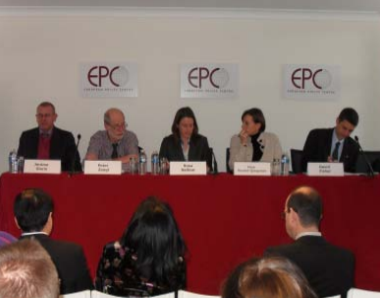
On December 15, the IFRC launched a synthesis report describing the findings and recommendations from a two-year study on IDRL in the European Union conducted by the IFRC and the National Red Cross Societies of Austria, Bulgaria, France, Germany, the Netherlands and the United Kingdom. Drawing on the IDRL Guidelines, the study examined legal and institutional frameworks for the receipt of international assistance at the EU level and in the six states of the involved National Societies.
The report was launched at a “policy dialogue” panel hosted by the European Policy Centre in Brussels, featuring ECHO Director General Peter Zangl, Director General of the Belgian Civil Protection Jérome Glorie, representing the Belgian EU Presidency, Elise Baudot-Queguiner, IFRC Legal Counsel, and David Fisher, Coordinator of the IFRC’s IDRL programme.
In her presentation of the report, Baudot pointed out that legal issues related to crossing borders to provide disaster assistance are generally much less problematic within the EU than in other regions, due to internal immigration and customs regimes that are much more open between members. Moreover, the development of European Community Civil Protection Mechanism and some specific rules related to emergencies at the EU level, as well as the bilateral agreements and traditions of cooperation between member states, had gone a long way toward preventing problems.
Nevertheless, Baudot and Fisher noted that the study had also found a number of gaps, for example, with regard to facilitating and regulating cross-border assistance by civil society institutions (like National Red Cross Societies), issues related to assistance coming from outside the EU, and issues related to the recognition of foreign medical qualifications, expectations as to costs and liability.
The report recommends that more member states examine their existing legal and policy frameworks for receiving assistance and consider filling any gaps. At the EU level, the report endorsed the ECHO initiative, currently underway, to develop guidelines for member states and also recommended that certain existing EU directives be amended to better account for the needs of emergency situations.
Dr. Zangl welcome the report, noting that while European countries are relatively well prepared to deal with disasters, they face more problems when they ask for and host assistance provided by others. Dr. Glorie noted that the Belgian government had decided to make the issue of “Host Nation Support” for in-coming international assistance a priority for its Presidency. Drawing in part on the work of the study, Belgium’s proposal for “Council Conclusions on Host Nation Support” was adopted by the Justice and Home Affairs Council on December 2.